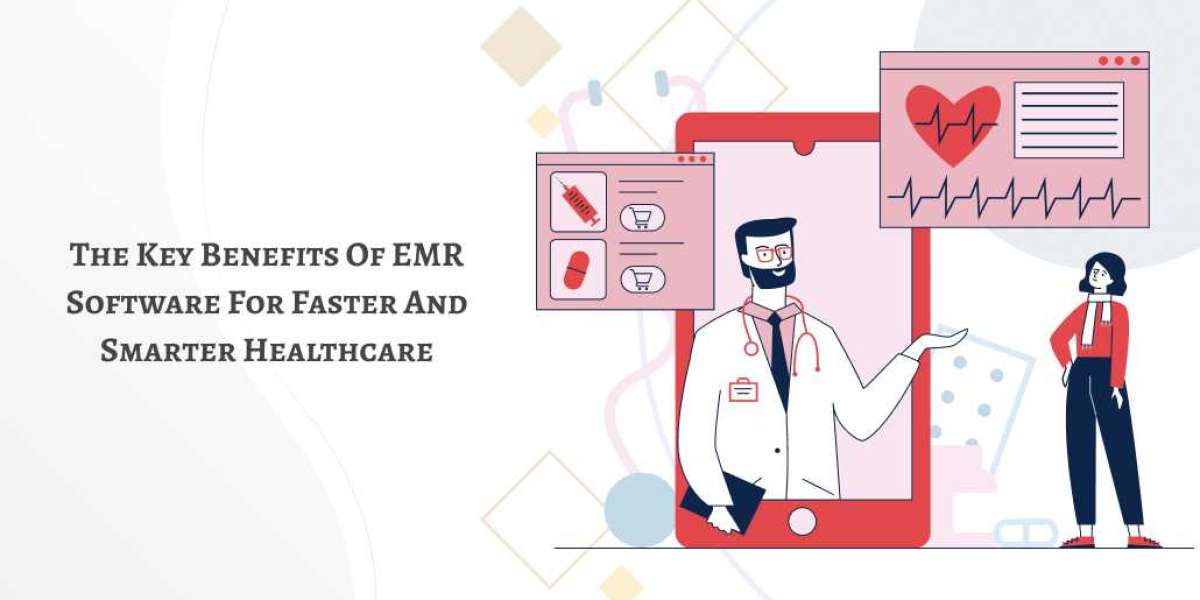Introduction
As the medical industry moves toward becoming more technology-driven, Electronic Medical Records (EMR) software serves as a foundation for these trends. EMR software digitizes the patient records to minimize inefficiencies, improve patient outcomes and automate back office administrative operations. But what exactly is EMR software, and how essential is it to modern medicine? This blog breaks down and explores the Future of EMR Systems, providing insights into how AI-Powered EMR Software solutions are changing the course of patient care.
What is EMR Software?
An EMR software is a computerized system that stores patient records such as medical history, diagnoses, treatments, and prescriptions. It substitutes the old method of keeping records on paper and assures that healthcare providers have immediate access to patient information. Hospitals, clinics, and private practices use EMR systems to enhance the quality of care and efficiency of care delivery.
The Role of EMR Software in Modern Healthcare
1. Enhancing Patient Care
EMR Software ensures that healthcare providers have real-time access to tolerant facts, which contributes to excessive precision diagnosis and timely treatment. EMR systems help doctors to make educated choices, thereby reducing the risk of medical errors.
2. Streamlining Administrative Tasks
Hospitals and clinics deal with huge volumes of data every day. EMR software automates appointment scheduling, charge, and insurance claim, significantly reducing paperwork and administrative burden. The current efficiency enables medical practitioners to focus excessively on long-term care.
3. Improving Communication and Collaboration
Best EMR software solutions make it easy to exchange information between medical assistance services, specialists, and patients. Clinical teams can cooperate competently to ensure continuity of care and better treatment results in shared admissions to patient archives.
4. Ensuring Data Security and Compliance
EMR software companies are developing systems for data protection and management compliance alongside stringent laws for HIPAA in space. High-tech encoding, multi-factor authentication, and audited account trail ensure that Unauthorised Access data is secure.
5. Reducing Medical Errors
A serious adverse event can arise from a mistake in prescribing and treatment. The EMR frameworks include resolution tools that alert healthcare professionals to the possibility of exchanges of medicines, allergies, and incorrect doses, thereby reducing the problems.
Key Benefits of EMR Software
1. Faster Access to Patient Data
Tolerant archives are just a mouse click away from EMR software. Healthcare providers are able to quickly retrieve data on previous diagnoses, medicines, and laboratory findings, primarily for faster and more faithful treatment.
2. Improved Workflow Efficiency
The productivity of work has been improved by hospitals and clinics using the most advanced EMR software. Medical practitioners are ensured that they can fulfill their extra responsibilities successfully thanks to automated documentation, electronic prescriptions, and real-time updates.
3. Better Patient Engagement
The existing EMR software includes a long-term portal where patients can enter medical records, agendas, and communicate with their doctors. This characteristic enables patients to take an active part in their medical journey.
4. Cost Savings for Healthcare Providers
EMR arrangements help healthcare facilities save costs by reducing paperwork, reducing administrative burdens, and improving efficiency. Automate the payment and insurance maintenance work to prevent further revenue losses due to errors.
5. AI-Powered EMR Software for Smart Decision-Making
Smart technology-driven EMR software revolutionizes healthcare by providing prognostic analysis, data entry automation, and personalized treatment advice. A vision based on artificial intelligence enables doctors to make more intelligent clinical choices, leading to improved tolerant results.
6. Seamless Integration with Other Healthcare Systems
EMR software integrates seamlessly with laboratory control systems, radiological systems, and pharmacy data bases, ensuring a smooth flow of information throughout a number of medical departments within a hospital.
7. Telemedicine Support
EMR software plays a key role in online consultations as telemedicine becomes more widespread. The doctor can enter patient information during a distant visit, ensuring that computerized analysis is as effective as in person.
The Future of EMR Software
1. AI and Machine Learning Integration
AI and machine education are the future of EMR systems. Deep insights into lifelong vitality, support early detection of diseases, and personalized treatment recommendations will be provided by AI-powered EMR software.
2. Blockchain for Enhanced Security
As cyber threats become more and more serious, distributed ledger technology is expected to improve information protection in EMR software. Patients' data will remain untampered and safe thanks to decentralised storage and coding.
3. IoT and Wearable Device Integration
Future EMR structures will integrate wearable devices and Internet of Things (IoT) innovations to allow real-time monitoring of tolerant organs. Medical practitioners will benefit from current inventiveness in recognizing anomalies in time and taking prepared steps.
4. Cloud-Based EMR Solutions
Cloud-based EMR software and EHR Software benefits from its portability and scalability. Hospitals are capable of storing and retrieving long-term data anywhere, ensuring a seamless working environment even in multi-site medical equipment.
5. Personalized Healthcare with Big Data
Massive statistical computational analysis will play a key role in EMR software by examining the long-term data form, projecting health movements, and enabling a personalized treatment plan anchored in the individual healthcare history.
Choosing the Best EMR Software for Your Hospital
In order to maximize its assistance, it is essential to choose the correct EMR software. Consideration should be given to the following essential elements:
1. User-Friendly Interface
Medical practitioners and administrative staff should find it easy to use a well designed EMR system. The intuitive interface ensures quick and effective use.
2. Scalability and Customization
Hospitals have different needs, so the most suitable EMR software should remain scalable and customizable to meet the unique requirements of all healthcare facilities.
3. Compliance with Regulations
Ensure that the EMR organization selected by the hospital administrator complies with permissible and supervisory requirements, such as HIPAA, GDPR, and alternative regional treatment suggestions.
4. Integration Capabilities
The ideal EMR solution should integrate seamlessly with the existing hospital supervision systems, laboratory data base, and third parties' intentions.
5. Robust Data Security Features
In view of the increasing threats to online safety, choosing an EMR organization and with powerful information encoders, role-based deterrences, and backup solutions is crucial to preserve delicate, persevering intelligence.
Conclusion
Rapid and intelligent patient care has been made possible by the use of EMR software, transforming the medical industry. Modern medicine depends on electronic medical records as much from sharpening patient engagement to decreasing errors and increasing workflow efficiency. AI-based EMR software, blockchain security, and IoT integration will enable improved healthcare results by further transforming the sector as technology progresses. For hospitals and clinics aiming to keep ahead, the best EMR software should be purchased so as to simplify operation and deliver top-quality patient care.
For healthcare professionals trying to enhance efficiency, protection, and patient satisfaction, a strong EMR system is not only an option but rather a prerequisite. EMR software is at the forefront of the digital future of healthcare!








